Our publications about the Traditional Chinese Medicine
The concept of unity
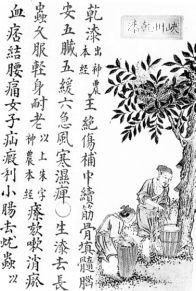
Our publications about the Traditional Chinese Medicine
The concept of unity

Cabinet médical
Dr
DAU Quang Luong
224, Avenue du Maine
75014 Paris
Tel. 01 40 44 80 82
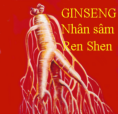
The
specialties praticed in our clinic
Acupuncture and Moxibustion
Traditional
Chinese Medicine
Handy Medicine:
Osteopathy
Energetic Massage
Relaxation
Medical Hypnose
Homeopathy
General Medicine
In the Traditional Chinese Medicine, the man
is considered like an integral entity in which every organ and every part of
the body is bound closely to the others in the same way as the tie between
the mind and the body, compatible to the Latin byword "Mens sana in
corpore sano " .
To understand the ties between the different parts of the body, we are going
to analyze the "Theory of the five energizing elements" .
These five elements are: Wood, Fire, Soil, Metal
and Water.
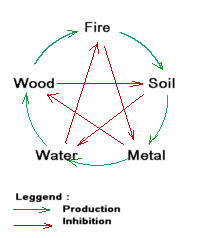
We could observe on the drawing that every energizing element is in relation
with the other four elements.
Now take like example element WOOD.
1) Wood is in relation with Fire by a productive tie (Wood generates Fire
= relation mother - daughter ).
2) Wood is bound to the Water which is its mother (Water generates Wood =
relation daughter - mother).
3) Wood dominates the Soil and forbids it according to a destructive
relation .
4) Wood is submitted to a permanent control of Metal (relation dominated
- domineering ).
So it is clear that any trouble of element Wood can provoke some problems to
the other elements and vice-versa. The physician's duty consists in raising
these unrests to the level of different elements and to determine their
origin to consider a radical and suitable therapy. A trouble to element Wood
can have an origin in itself, that means an unbalance of energy Yin - Yang
in itself, or a faraway origin localized in the other elements.
To every energizing element corresponds an internal organ of Yin character
and a hollow internal organ of Yang character as it is shown in the
following drawing:
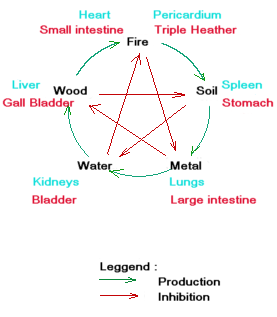
In the Traditional Chinese Medicine, the
internal organs are classified in two opposite groups following the
dialectic Yin - Yang:
a) The Organs are of YIN character because they are not communicated
directly with the outside; they are located therefore in the more internal
layer of our body. These are: Liver, Heart, Spleen, Lungs and Kidneys.
b) The Viscera are the hollow organs that have a direct communication
with the outside; they are of YANG character. These are: Gall bladder, Small
Intestine, Stomach, Large Intestine, Bladder .
The state of mind, like the feelings, has a narrow relation with the
internal organs. The mind and the body have an reciprocal influence one on
the other as it is shown in the following drawing:
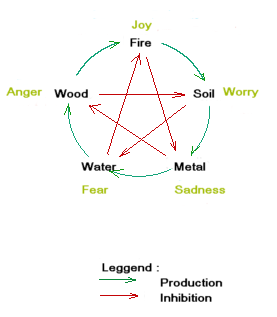
Only while considering the unrests of our organism under this point of
global view that we can act to the root of every health problem
to solve it.
